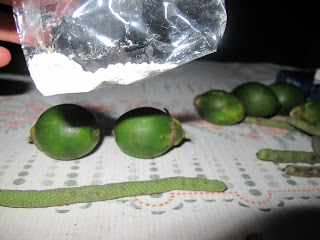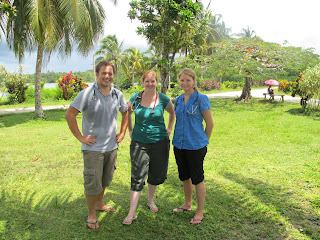There is a very popular drug in the Solomon Islands that grows naturally here. It’s a small nut called Betel nut (pronounced beetle). It seems to act as a bit of a relaxant, and was traditionally used before big community meetings and debates to calm everyone down so that discussions didn’t get too heated. But, like every drug, it has it’s addicts.
I didn’t get around to having a try of any, but thought I’d relate the process and what it’s like from what Mia told me.
 |
| Powder, Betel nut, and sticks |
You buy the nut along with the required lime powder stick from any local market for around $2 (around 20p) and then you get a bush lime as well. You take the green skin off the betel nut and inside, is the little nut. It apparently looks a bit like a large browny macadamia nut – about the size of a walnut, but round. You then chew it until it gets soft - I’m told it doesn’t taste all that great (apparently it also makes you salivate quite a lot). Next, you get a mustard stick, and dip it in the lime powder and bite that (with the betel nut still in your mouth). The result is a reaction to the lime powder which gives you the desired buzz and also turns the liquid a BRIGHT red. You then spit out the liquid when you’re done – and if you happen to be walking down the street you spit it right there – this is why I was a bit concerned that there were blood spatters EVERYWHERE when I arrived in Honiara.
 |
| leftovers (normally spat onto street) |
Different people have different reactions to the process. Some say they get a bit relaxed and calm. Most people get hot and a bit sweaty. Others get light headed and nauseous. Also, apparently you can increase the hit by chewing with tobacco as well.
I’d really like to know what the chemical is that causes its effect as I’m not sure how much of addictions to it are social/emotional or whether is much physical dependence. One definite problem is that it does lead to skin cancers of the mouth – Mia has shown me a picture of one on the inside of someone’s lip – about the size of a tennis ball – not pretty!























